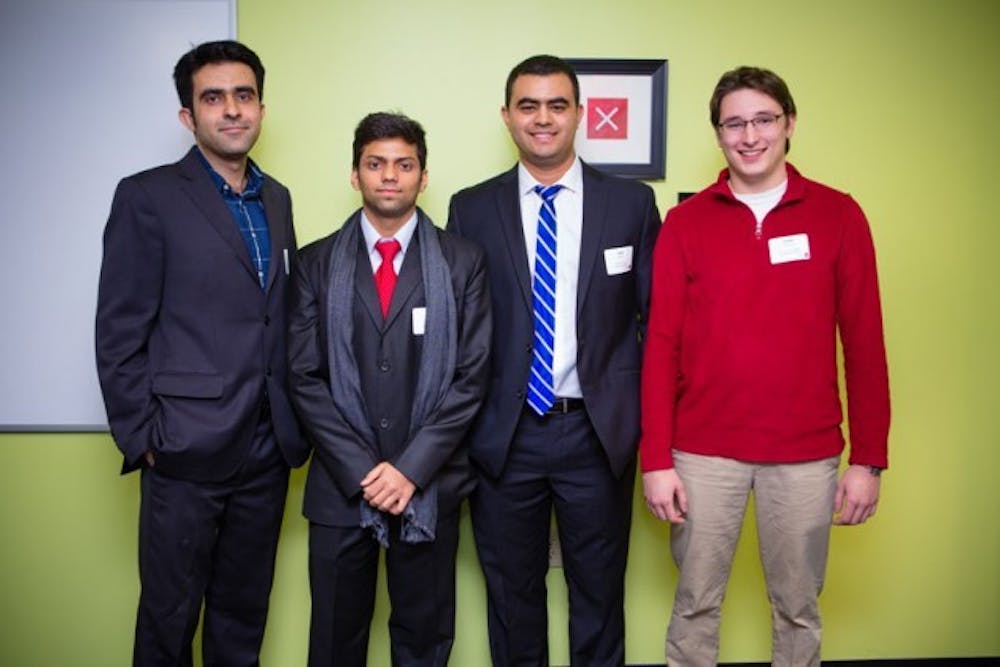Late in January, four UB students ended their week up to $8,000 richer.
Throughout Entrepreneurship Lab, or “eLab,” – a three-week winter session course – students were able to pitch startup ideas for fellowship money. From a new search engine for big companies to portable walls to prevent flooding, students used the class to share their ideas to a panel of investors.
Students Mahmoud Kamal Ahmadi, Jorge Cueto, Joseph Peacock and Rohan Shah collected $8,000 of seed money for their projects. The money came from an anonymous donation to the School of Management.
The purpose of the eLab class was to help student entrepreneurs accelerate the startup process, according to Yong Li, associate professor of operations management and strategy and one of the program’s teachers.
“Just as you experiment in a scientific lab, we hope our students use the eLab to experiment with their entrepreneurial ideas,” he said.
The course, which was made up of 13 undergraduate and graduate students, helped students identify their markets and perfect their business pitches before presenting them to a panel of local business leaders and investors. Last year, six of the twelve students enrolled in eLab won between $5,000 and $8,000 of seed funding for their projects.
Mahmoud Kamal Ahmadi, a Ph.D. student studying chemical and biological engineering, created PreMer X, Precious Metal Retrieval.
The purpose of PreMer X is to retrieve and recycle precious metals – such as gold, silver and platinum – from solutions so they are not wasted, according to Ahmadi.
Joseph Peacock, a computer engineering major, created Igloo, an enterprise search engine that allows businesses to access files across their network from one place. It gives individual employees the ability to easily search for lost or misplaced documents. The program can save companies well over $1 million a year in productivity with 200-plus employees, according to Peacock.
Rohan Shah, a senior computer science major, created InteractiveX with his partner, Nate Burgers, a computer science major, who wasn’t in eLab.
InteractiveX is an interactive eBook that not only provides text to the reader but can also run programs. Shah said an example would be a math eBook with a scientific calculator built into the programming.
Jorge Cueto, a civil engineering major, created Smart Walls, which are portable, deployable walls that stretch as tall as necessary to protect areas against flooding. They are also more cost-effective than other flood barriers because they’re made of concrete instead of Kevlar, steel or aluminum.
Despite the ingenuity of their inventions, many of the students have not created fully functional prototypes yet. But along with their winnings, they’re going to receive some help from UB.
“The eLab course is not a traditional course in that our students learn tools and skills through various ways, including short lectures and guest speakers,” Li said.
Robert Genco, a professor of oral and microbiology and Martin Casstevens, a business formation and commercialization manager, taught the class with Li.
Three professors leading the class isn’t the only thing that separated it from other courses, Li said.
Students took a trip to a forum hosted by Western New York Venture Association, a local non-profit that provides opportunities for local businessmen to present their designs. Students watched entrepreneurs pitch their ideas and had a question and answer session with Buffalo Angels, a group of investors who can choose to back a presented idea or product.
Li said that as part of their award the students will receive “mentorship and a shared space” in the UB Technology Incubator. The Technology Incubator aims to help the economic development of western New York by commercializing inventions at UB, according to the Office of Science, Technology Transfer and Economic Outreach’s website.
“Like other science-based startups, we will spend the money mostly to research and develop [a] prototype,” Ahmadi said. “We might spend a little on marketing to explore new customers.”
email: features@ubspectrum.com





